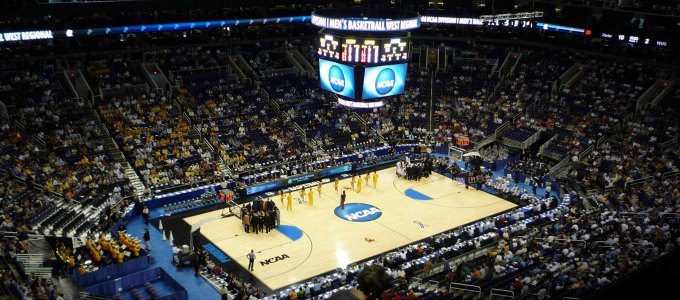If Tom from accounting is oddly cheering from his cubicle and the company's network seems a little sluggish, it can only mean one thing: the start of March Madness, also known as the annual college basketball tournament that determines the sport's division 1 champion.
This week each year has become infamous for sharp drops in employee productivity and Internet bandwidth, as workers for whatever reason get overconsumed in the idea of watching basketball in the middle of the workday on their computers.
Nobody is turning in their TPS reports on time, because everyone is huddled around Sally's desk freakishly tense at the thought that, with 2.8 seconds to go, all underdog Cal Poly Tech needs is a 3-point shot to upset the top-rated Kentucky Wildcats.
March Madness is truly a unique event in our country, and each year it oddly becomes one of the most talked about workforce issues. It's the only American sporting event where workers feel the need to disrupt whatever they are doing to watch a basketball game. It's the only event I know of where research firms throw out bogus productivity loss figures to ruffle the feathers of employers. Even employees who haven't watched one second of college basketball seem to embrace the hoopla that is March Madness.
This usually prompts bosses and companies to clamp down on their employees by making sure they're staying on task and not secretly watching the games. This is a huge mistake.
Before I make my case, there is some information I need to disclose.
I went to school at Indiana University, home of the five-time basketball National Champion Hoosiers. To say that I am a fan of college basketball and the Hoosiers is like saying humans are fans of water. People in Bloomington, Indiana, live and die by Hoosier basketball.
As a student, I had season tickets. When ESPN's College Gameday came to Bloomington, my roommate and I had no issue waking up at 3 a.m. to camp out in front of Assembly Hall in the middle of February to ensure we had a front-row seat — even though we would both scoff at the thought of waking up for a 9:30 a.m. lecture. This was considered normal behavior — when we arrived at the stadium 20 minutes later, a small village of tents was already erected. We were late.
Offices are filled with people like me. But that's neither here nor there. It doesn't really matter why or how a college basketball tournament has become the obsession of office workers and the bane of managers. What matters is that employers recognize the inevitable perception of productivity loss as a way to channel the excitement the tournament brings into a way to build engagement and culture.
In an era of flexible work arrangements, autonomous management and wanting to build a culture of trust, it would be counterproductive for talent managers to squash progress on those fronts by going hard against March Madness in the office.
Workers know they have work to get done, so many of them will make time around the games to get done what needs to be done. This doesn't mean rescheduling meetings to accommodate the games — though I'm sure some employees wouldn't complain if you did. It means not minding when an employee is streaming a game at their desk while working, or putting a TV in a common area so employees can catch a score on the way to a meeting.
Putting this mindset in place isn't promoting productivity loss; it's working with employees to create an environment where work can still get done in spite of people's interest and desire to watch the games.
And for what it's worth, don't limit this mindset to March Madness. So long as the works gets done at a high level and the nature of the job allows for it, it doesn't necessarily matter how, when and where employees do their work.
So when Thursday comes around and the first jump ball goes into the air, let's not let a little madness get in the way of a happy and engaged work environment.
This article originally appeared in Chief Learning Officer's sister publication, Talent Management.
















